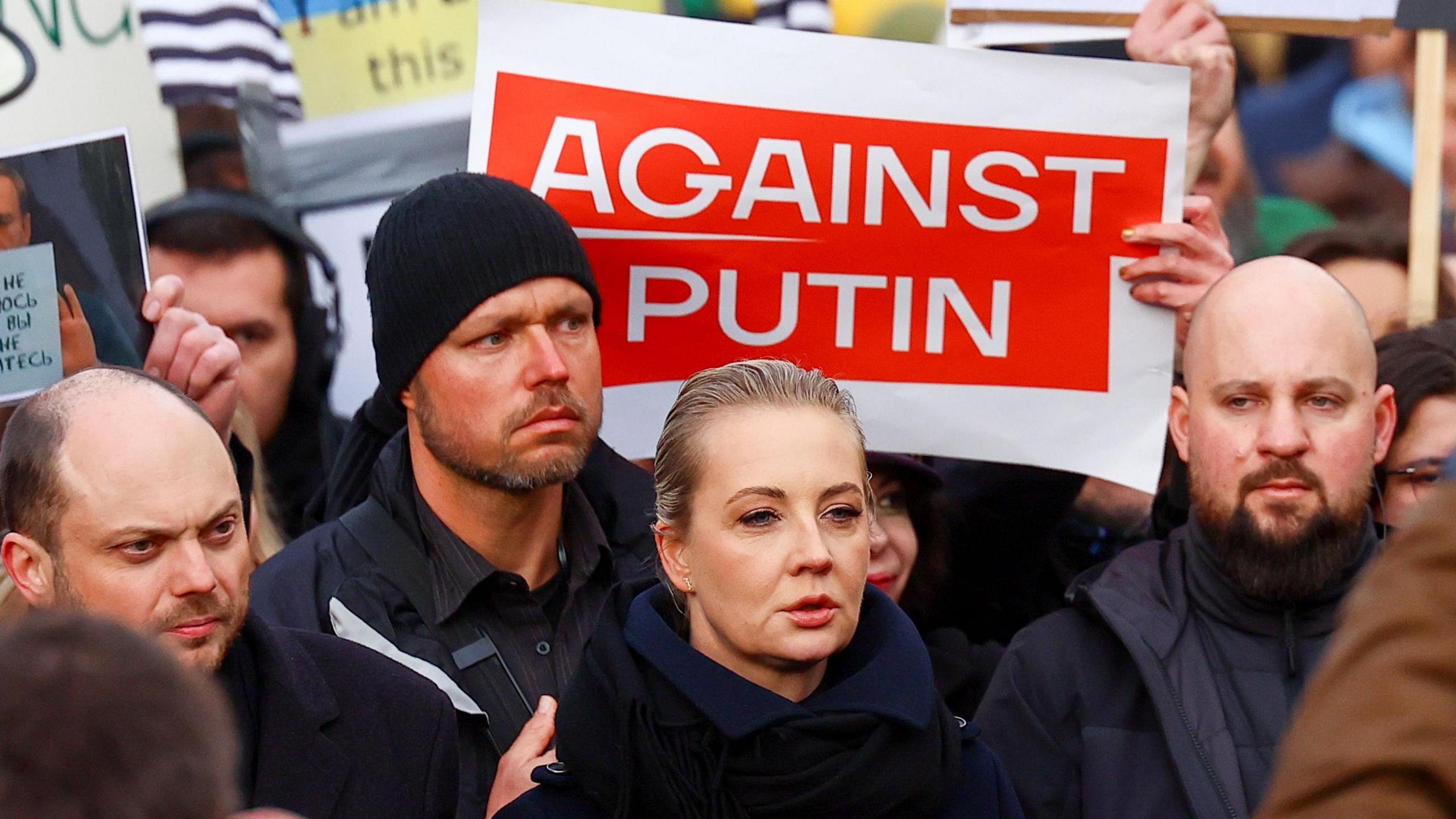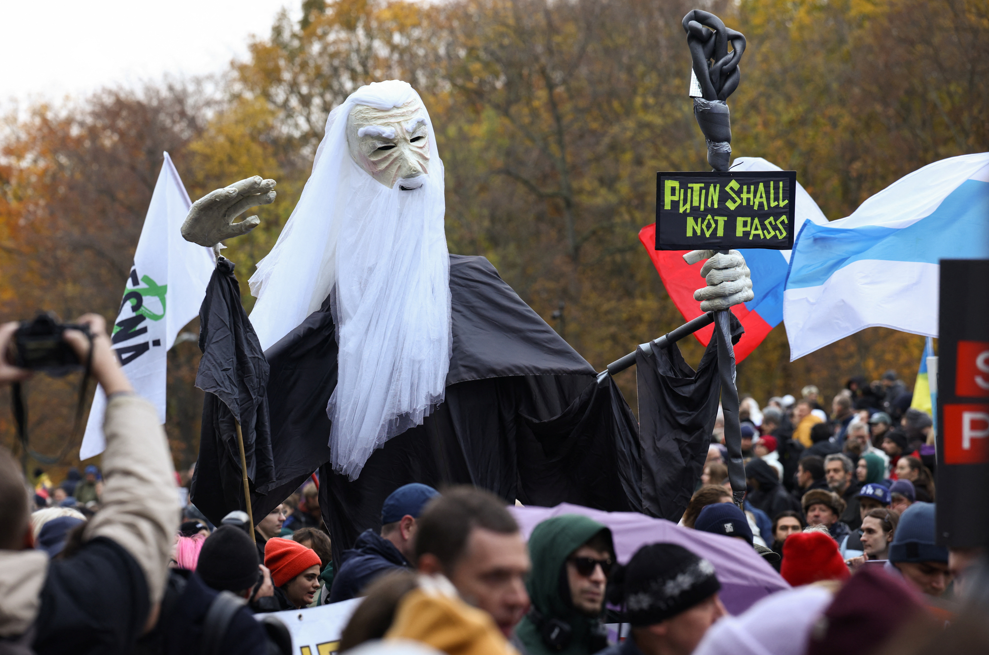Keep protesting, says Navalny's widow at Berlin march

Yulia Navalnaya (C) led the march with other leading exiled opposition figures
- Published
The widow of Russian opposition leader Alexei Navalny has urged thousands of supporters marching through central Berlin to continue their protests against President Vladimir Putin and the war in Ukraine.
"One protest alone won't change anything. We need to keep coming out," Yulia Navalnaya said, at the first rally she and other prominent opposition figures have led since being forced into exile.
People carried the blue-and-white Russian opposition flag as well as Ukrainian flags, while chanting "no to war" and "Putin is a killer" in Russian.
Many members of Russia's opposition have been exiled since the Kremlin escalated its crackdown on dissent, jailing hundreds - perhaps thousands - of people for their political views.
The opposition says it has three main demands - the "immediate withdrawal" of troops from Ukraine, the trial of Putin as a "war criminal" and the liberation of all political prisoners in Russia.
The Russian war on Ukraine was a major focus of the protest.
Ukrainians often accuse the Russian opposition of failing to appreciate their suffering, and failing to do enough to stop the war being waged by their country.
Just last week, Ukrainian protesters interrupted a speech by Yulia Navalnaya in Lisbon, playing the sound of air raid sirens and demanding that she condemn the war, which she did.
This march seemed in part an attempt to address that impression, although one protester said he didn’t agree with the prominent slogan "Putin = war", because the invasion of Ukraine is being fought and supported by many Russians.
Oleg Orlov, co-chair of the Nobel Peace Prize-winning organisation Memorial, who was sentenced to jail in Russia for his anti-war and anti-government statements, held a banner that read: "Victory for Ukraine, Defeat for Putin, Freedom for Russia."
Orlov now lives in Germany in enforced exile after he was released in a prisoner swap in August. He called for Ukraine's allies to continue supplying weapons.
"Victory for Putin in Ukraine will conserve his fascist regime in Russia for many years," he told the BBC.
"More weapons for Ukraine is important, including for the future of Russia - because if Putin wins, then Russia is defeated - that is, the Russia that all of us here dream of and that we want to build.
"Those in Europe who talk about peace at all cost in Ukraine, those prepared to appease the aggressor, do not understand the mine they are laying for the future of Europe itself."

Several thousand Putin opponents joined the march
The march ended outside the grand building of the Russian embassy on Unter Den Linden, where the three protest leaders clambered onto the back of a truck, linked arms and thanked the crowd for their support. They were greeted by cheers.
Navalnaya said her husband had always thought you should go to protests in the same way you go to work.
She urged people to march repeatedly, not only for themselves - but for Russians inside the country who can’t do the same, “for the political prisoners… and for those who have been killed.”
Vladimir Kara-Murza, who was freed from jail in August after spending over two years - 11 months of them in solitary confinement – told the BBC he was “proud” to see a “sea of faces” at the rally – although the march was smaller than some people had anticipated.
“There are millions in Russia who feel the same way, who are against the war, Putin’s regime. But in Russia it’s impossible to do what we just did here today. For the smallest act of protest you will end up in prison, as I did.”
In his speech, he called the embassy "a spy nest of Russia".
"It will be an embassy again," he vowed.
Navalny believed he would die in prison, memoir reveals
- Published12 October 2024
I’ll stand for Russian president when Putin's gone, Navalny’s widow tells BBC
- Published21 October 2024
One young IT worker, Anastasia - originally from Kazan in Russia - said she left in March 2022 because she could not stay in a country waging a war that she opposed.
She said it was “impossible to protest in an authoritarian state”, adding that this is why the rally was so crucial.
The crowd was not huge, but it was diverse, including supporters of Alexei Navalny alongside anarchists and young men recruiting people to go and fight for Ukraine. We met protesters from as far away as Norway, Cyprus and Poland.
As Yulia Navalnaya was whisked away by police, for security, the crowd gathered beside a memorial for those killed in Ukraine - chatting quietly and singing along with a young man playing guitar.
One couple told the BBC that for them, this rally had given them a little hope - and sense that they weren’t alone.
“The mood now among Russians abroad is bad. People don’t believe in change. Everything looks bad. They see no point in protesting,” Polina said.
“Maybe they’re right. But there’s no shame in doing little; what's shameful is doing nothing. That’s what Alexei Navalny once said.”